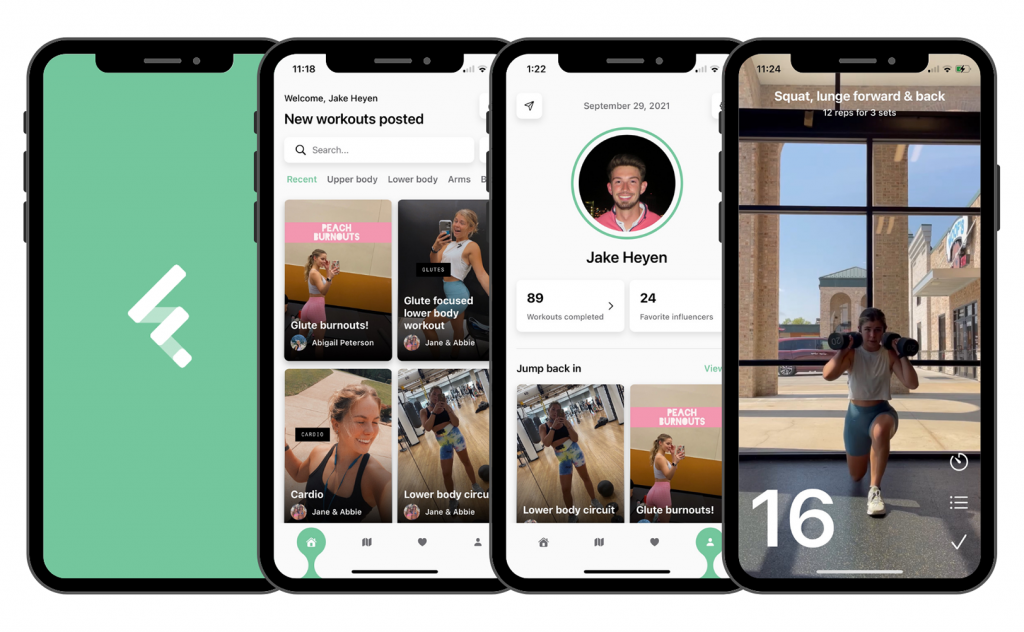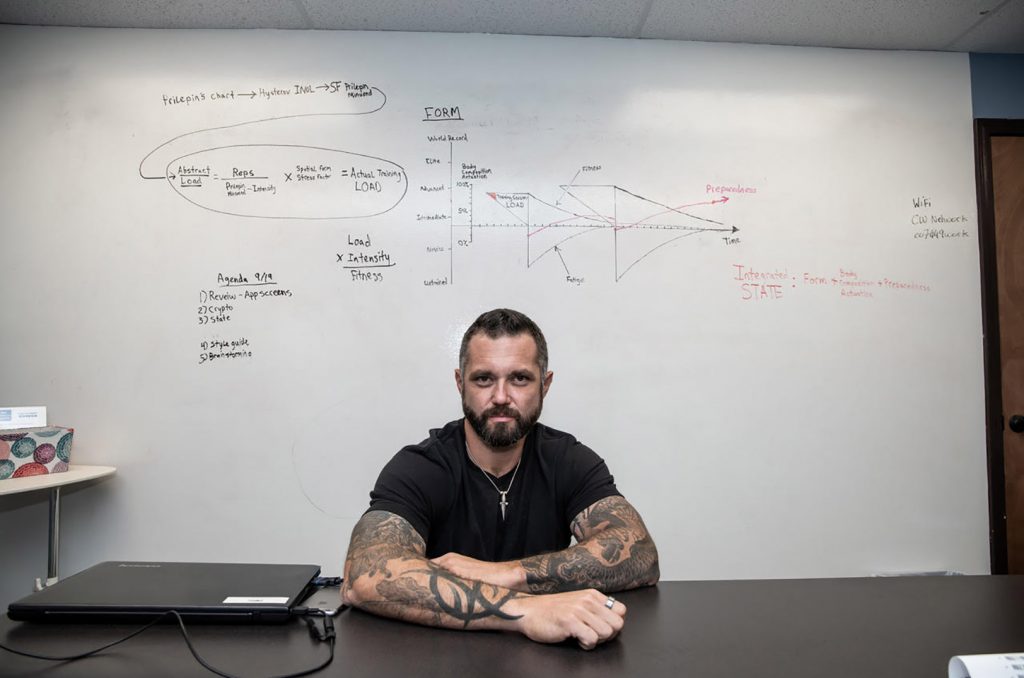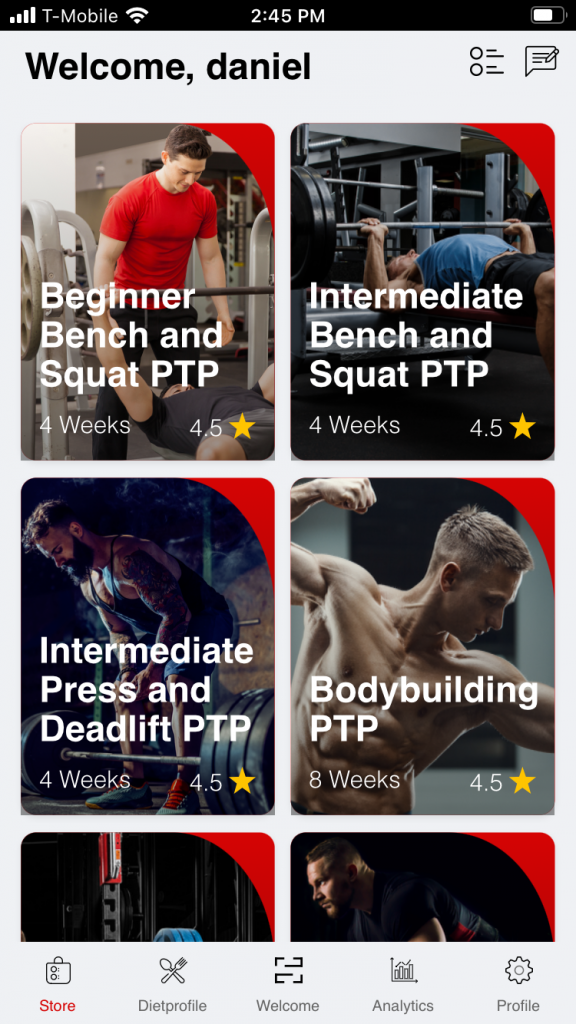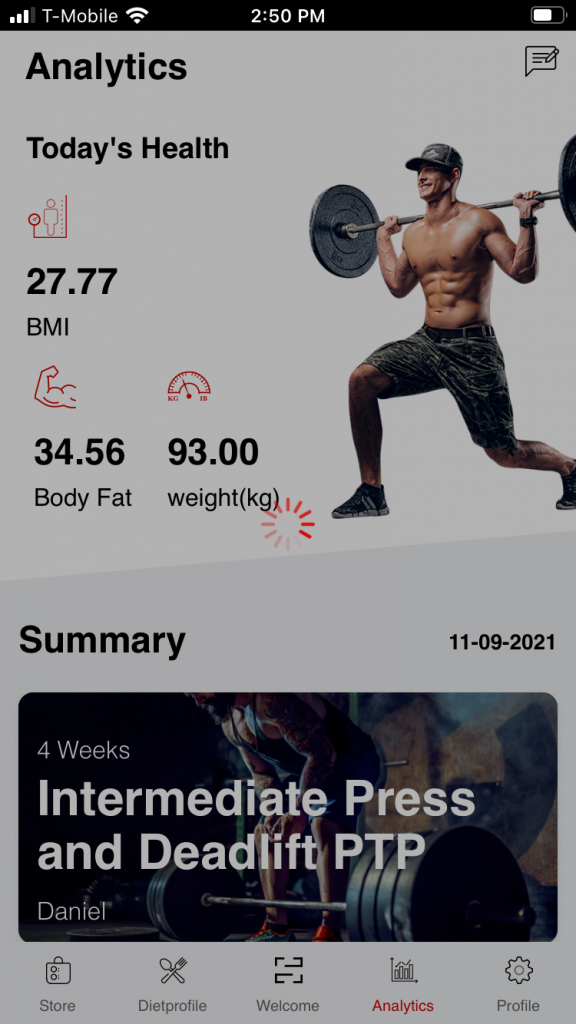Jake Heyen’s Fitic exercises its potential at the intersection of pandemic-pumped fitness and influencer marketing industries, the Kansas City founder said, detailing the intertwined world of fitness-minded consumers and content creators.
“We love the fact that we sit within two industries that are poised for explosive growth going forward,” said Heyen, who also serves as the startup’s CEO.
“The fitness app industry is currently a $6 billion dollar industry with 353 million fitness app users across all platforms. The industry is projected to grow to $59 billion by 2027,” he noted, adding the influencer marketing industry is “currently a $10 billion dollar industry and projected to grow to $84 billion by 2028.”
Such growth likely reflects lifestyle changes during the COVID-19 pandemic. Lockdown in communities and changing patterns of working remotely from home prompted people to adapt fitness routines or develop a new wellness regimen. Widespread use of mobile apps in general and fitness content on social platforms like TikTok, YouTube, and Instagram have also inspired people to get fit.
Fitic enables users to workout with favorite fitness creators. The app provides high-quality fitness content so users can perform, save, and track workouts. Influencers, in turn, can use Fitic to monetize workouts, connect with their followings, and build their brands.
Click here to follow Fitic on Instagram or see which influencers already are on board with the app.
Heyen, 23, recently graduated from the University of Missouri with a degree in finance. He immediately began working at Tortoise Capital Advisors while also managing Fitic.
“While at the University of Missouri, I was part of a student-led venture capital fund,” said Heyen. “I got exposure to the startup ecosystem from an investor point of view, and this really sparked my interest in founding a startup myself.”
Heyen quit his full-time job to develop Fitic once the app gained traction and required a greater time commitment. As a nontechnical-based app founder, Heyen devoted most of his initial time to learning how to develop the full tech stack for his iOS app.
The app officially launched to the public Saturday.
Two specific trends inspired Heyen’s development of Fitic and led to key features that differentiate the app from competitors, he said.
First, production of fitness content has become democratized through social platforms, Heyen noted. Unlike Patreon or OnlyFans for other creators, there wasn’t an open source platform so fitness creators could monetize their content.
Accordingly, Fitic’s open platform allows fitness creators to join the app for free, post workouts, and monetize the content. No longer does a fitness trainer or instructor need to be aligned with a gym or training facility bound by a class schedule, customer base, and other perimeters within that business model, he said. The app also alleviates concerns about sharing physical workout space during the pandemic.
A fitness influencer also needn’t “be an actual employee of some giant fitness app and work 24/7 for them only to have what they do be owned by that company still,” Heyen explained. “They can join Fitic and post workouts on their own time and have full freedom and ownership of the content still. Fitness creators get paid for the engagement that they receive.”
The second trend: Fitness has joined the mobile tech industry like never before.
“People want to workout directly on their mobile devices anytime and anywhere,” Heyen said. “They want fitness content that they can use on their own time. They also want this content to be fresh and new on a regular basis.”
Fitic taps into consumer preferences for convenience and diversity in the fitness industry, he added. Users can customize their workout experience by following preferred fitness creators, save those workouts, and even take personalized notes for historical tracking. Interactive fitness content can also be displayed full screen.
Cashback with accountability
Having the resources and tips of a certified personal trainer right in your pocket is powerful, said Jasper Sanders, whose Deposit The Work app draws on his experience as a lifelong athlete and professional fitness expert.
“I am not saying everyone has to be a professional bodybuilder or athlete, but I do believe some type of physical fitness should be a staple in everyday life,” said Sanders, who quietly developed and released the app from Kansas City, Kansas.
Deposit The Work helps users learn and sustain a healthy lifestyle through access to more than 300 workout videos, tracking for workouts, health-oriented recipes, and a fitness apparel shop. The app’s most popular feature enables users to earn credits, or rewards with monetary value, based on meeting goals. Users can withdraw earnings through a digital wallet and deposit the cash into their bank account.
“Having the cashback aspect has really kept users focused and accountable with their fitness,” said Sanders.
Deposit The Work is also integrated with health tracking platforms Apple Health and Fitbit. Data is synchronized to track the calories burned and heart rate throughout the day as well as miles logged by a user.
Sanders played college football and participated in professional football training camps. He earned a bachelor of science degree in kinesiology and exercise science at the University of South Dakota. Once his football career ended in 2015, Sanders began a career as a fitness trainer.
He later developed Deposit The Work for a broad-based audience and sought to incorporate accountability as an important motivational tool in his app..
Click here to learn more about Sanders’ and Deposit The Work’s story.
“Fitness apps do not give the accountability of an in-person trainer. I wanted to come up with an innovative and motivating way to attract users to start on their fitness goals,” said Sanders. “The ability to actually see your wallet going up, while your pounds are going down, on Deposit The Work is exciting.”
Deposit The Work’s development team currently is adding in such features as energy balance, he teased.
“We will connect users’ food logs with our app to show a pretty accurate graph on how much they should be eating compared to the amount of calories that they burn throughout the whole day,” said Sanders. “This feature will be completely personalized based on information that users put in their profile.”
A new training program feature also enables users to have more guidance on the app. The intent is to help increase focus on fitness goals with a day-by-day fitness program to follow.
“A variety of programs to choose from [include] Weight Loss, Functional, Muscle Build, Strength Training, and an Endurance, Speed, and Plyometric program,” explained Sanders. “Each of these will have multiple different programs, six to sixteen weeks long, based on their category.”
Click here to follow Deposit The Work on Instagram or to download the app.
Scaling fitness expertise
Daniel McKee, creator and founder of Stratfit, has been dedicated to fitness for two decades. His 15 years of personal trainer experience and extensive study of weightlifting, powerlifting, and bodybuilding literature provided a foundation of knowledge for Stratfit.
“I have always sought to apply every bit of knowledge I gain to my clients’ processes,” said McKee. “With StratFit, I’m seeking to expand my reach in that quest by giving training optimization tools to trainers and trainees worldwide.”
Stratfit’s “scientifically designed fitness platform” allows elite strength coaches to design and construct training programs, post and monetize the content, and brand their services. With Stratfit serving as a “virtual expert trainer,” users gain access to specialized training, progress charts, training analytics, and social media interfaces, he detailed. Gyms may also use Stratfit as a subsite, where users can register for gym programs.
McKee wanted to share his body of knowledge to a vast audience, but faced constraints of time and geography. Those limitations led to the development of Stratfit.
“After I learned the full ins and outs of fitness training theory and the possibilities that knowledge could afford people all over the world, I realized it was impossible to apply it all in real-time in praxis,” said McKee. “Technology provides incredible possibilities to fully merge the theoretical and practical in so many fields. I dedicated myself to making it happen for the fitness industry.”
Click here to follow Stratfit’s strength training on Instagram.
Stratfit fills a gap for users and trainers seeking to connect and utilize “the highest concepts of training science,” said McKee.
“There isn’t any system that allows trainers to practically apply all the concepts of training science theory in practice. StratFit has a super-system of equations to optimize all the variables of training for prescription, allowing trainers to perfect the design of training programs of any length,” he explained. “Our artificial intelligence system auto-regulates the program for any user anywhere via the app, making sure their own training is optimal at any moment.”
Stratfit helps trainers build programs, sell them at scale, and optimize the training process for users, McKee added, noting it does the same for the nutrition process, based on the user’s time-sensitive body composition goals.
“Our app is ‘on’ every second of every day, optimizing the health and performance of every user in 360-degree fashion,” he said. “It’s a win for everyone.”
This story is possible thanks to support from the Ewing Marion Kauffman Foundation, a private, nonpartisan foundation that works together with communities in education and entrepreneurship to create uncommon solutions and empower people to shape their futures and be successful.
For more information, visit www.kauffman.org and connect at www.twitter.com/kauffmanfdn and www.facebook.com/kauffmanfdn

















































